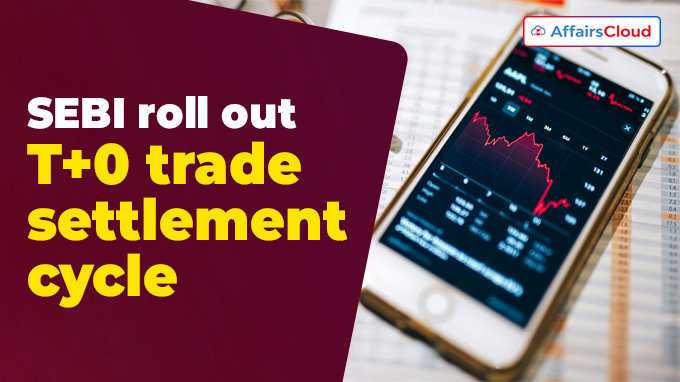 Securities and Exchange Board of India (SEBI) launched the beta version of T+0 rolling settlement cycle (same-day transaction settlement) on an optional basis in addition to the existing T+1 settlement cycle in equity cash market.
Securities and Exchange Board of India (SEBI) launched the beta version of T+0 rolling settlement cycle (same-day transaction settlement) on an optional basis in addition to the existing T+1 settlement cycle in equity cash market.
- The provisions of T+0 came into effect from March 28, 2024.
About T+0 Trade Settlement Cycle:
i.This allows same-day settlement of stock trades, instead of one-day settlement period (T+1) i.e. waiting for a day for the trade to settle and funds/stocks to be delivered.
ii.The beta version of the T+0 settlement was introduced for a limited set of 25 scrips and with a limited number of brokers.
iii.SEBI will evaluate results at three- and six-month marks to decide on further rollout.
iv.This will ensure cost and time efficiency, transparency in charges to investors and strengthen risk management at clearing corporations and the overall securities market ecosystem.
Operation Guidelines:
SEBI has laid out an operation guidelines for the short settlement cycle. The guidelines includes,
i.Eligibility: All investors who are able to meet the timelines, process and risk requirements prescribed by Market Infrastructure Institutions (MIIs) are eligible to participate in the segment for T+0 settlement cycle.
ii.Trade Timings: One continuous trading session from 09:15 AM to 1:30 PM.
iii.Price Band: The price in the T+0 segment will operate with a price band of +100 basis points(bps) from the price in the regular T+1 market. This band will be re-calibrated after every 50 bps movement in the underlying T+1 market.
Benefits for Investors:
i.Increased Liquidity: Quicker access to funds facilitates faster reinvestment and capital utilization.
ii.Improved Flexibility: Day traders can react promptly to market changes and utilize freed-up funds for same-day transactions.
iii.Reduced Risk: Immediate settlement potentially reduces counterparty risk, eliminating default possibilities.
List of Eligible Stocks for T+0 Settlement:
1. Ambuja Cements Ltd.
2. Ashok Leyland Ltd.
3. Bajaj Auto Ltd.
4. Bank of Baroda
5. Bharat Petroleum Corporation Ltd
6. Birlasoft Ltd
7. Cipla Ltd.
8. Coforge Ltd
9. Divis Laboratories Ltd.
10. Hindalco Industries Ltd.
11. Indian Hotels Co. Ltd.
12. JSW Steel Ltd.
13. LIC Housing Finance Ltd.
14. LTI Mindtree Ltd
15. MRF Ltd.
16. Nestle India Ltd.
17. NMDC Ltd.
18. Oil and Natural Gas Corporation
19. Petronet LNG Ltd.
20. Samvardhana Motherson International Ltd
21. State Bank of India
22. Tata Communications Ltd.
23. Trent Ltd.
24. Union Bank of India
Additional info:
It should be noted that SEBI has shortened the settlement cycle to T+3 from T+5 in 2002 and subsequently to T+2 in 2003, and T+1 in 2021 (fully implemented w.e.f. January 27, 2023)
T+1: Under T+1, trade settlement takes a day, with stocks or funds not reflecting in accounts until the following day. Sellers receive only 80% of cash on the sale day.
T+0:
i.T+0 settlement enables immediate addition of stocks to accounts upon purchase, facilitating same-day trading and full fund availability.
ii.There are two trading phases for T+0 settlement:
- Phase 1 for trades until 1:30 pm, settled by 4:30 pm, and
- Phase 2 for trades from 1:30 pm to 3:30 pm.
iii.In the T+0 segment, prices can vary within a range of +/-100 basis points from the regular T+1 market price. This range will be adjusted every time the T+1 market moves by 50 basis points.
NSE Cuts Transaction Charges by 1%
The National Stock Exchange of India (NSE) has approved a reduction of overall transaction charges across cash equity and equity derivatives segments by 1% starting April 1, 2024.
- This decision is estimated to impact NSE’s revenue by approximately Rs 130 crore per annum.
Key Points:
i.Transaction charges are levied based on trading value slabs, with the reduction expected to benefit investors and brokers, particularly if trading volumes increase significantly.
ii.In 2023, the NSE rolled back a 6% increase in transaction charges imposed on the equity cash and derivatives segment.
iii.The increase in charges in January 2021 by 6% aimed partly at strengthening the investor protection fund trust.
Additional info:
i.The NSE Board has also approved the sale of NSE Information Technology (NSEIT)’s digital technology business, including its subsidiaries, NSEIT US, Aujas Cybersecurity, CXIO Technologies to Investcorp, a US-based global alternative investments manager.
ii.The sale is expected to be completed by March 31, 2024, on a slump sale basis.
Note: NSEIT is a 100% subsidiary of NSE Investments Limited (formerly known as NSE Strategic Investment Corporation Limited).
Recent Related News:
i.Ahmedabad (Gujarat)-based real estate developer Shivalik Group has received regulatory approval from the SEBI for its inaugural fund- Shivalik Investment Fund as a Category
II Alternative Investment Fund (AIF). The fund aims to raise Rs.300 crore through private placement including Rs.150 Crore Green Shoe Option.
ii.SEBI has empanelled 12 entities, including Ernst & Young LLP (EY), KPMG Assurance and Consulting Services LLP, to provide digital forensic services to its search team for onsite data acquisition during search and seizure operations. This empanelment will be valid for 2 years.
About Securities and Exchange Board of India (SEBI):
Chairperson– Madhabi Puri Buch
Headquarters– Mumbai, Maharashtra
Establishment- 1992




